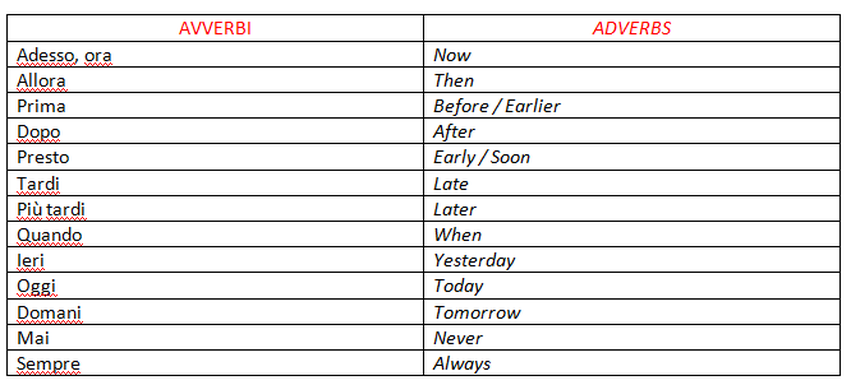GLI AVVERBI DI TEMPO
TEMPORAL ADVERBS

Gli avverbi di tempo si usano per specificare il momento in cui si svolge l'azione espressa dal verbo. I principali avverbi di tempo italiani sono:
Time adverbs are used to specify the moment when the action expressed by the verb takes place. Principal italian time adverbs are:
es. Ieri ho mangiato una mela
Michele si è svegliato improvvisamente
Gli avverbi di tempo presenti nella frase si riconoscono perchè rispondono alla domanda "quando?":
"Domani vado al mare." "Quando?" "Domani."
Time adverbs are easily recognizable in sentences because they answer to the question "When?"
"I'm going to the beach tomorrow." "When?" "Tomorrow."
Time adverbs are used to specify the moment when the action expressed by the verb takes place. Principal italian time adverbs are:
es. Ieri ho mangiato una mela
Michele si è svegliato improvvisamente
Gli avverbi di tempo presenti nella frase si riconoscono perchè rispondono alla domanda "quando?":
"Domani vado al mare." "Quando?" "Domani."
Time adverbs are easily recognizable in sentences because they answer to the question "When?"
"I'm going to the beach tomorrow." "When?" "Tomorrow."
GLI AVVERBI DI MODO
ADVERBS OF MANNER
Gli avverbi di modo (o maniera) specificano il modo in cui avviene l'azione. Per riconoscerli si può porre la domanda "come?". Gli avverbi di modo sono numerosissimi, dato che si possono ricavare da quasi tutti gli aggettivi qualificativi.
Ci sono vari modi per formare gli avverbi di modo: uno di questi è aggiungere il suffisso -mente alla forma femminile dell'aggettivo (triste --> tristemente; piacevole --> piacevolmente; completo --> completamente).
Un altro gruppo si forma con i derivati in -oni: a cavalcioni, a bocconi, a tastoni, etc.
Un altro gruppo è formato da modali come bene, male, volentieri, meglio, peggio, etc.
es. Era buio pesto, perciò dovetti camminare a tastoni.
Mariella si allontanò tristemente dopo aver saputo la notizia.
Adverbs of manner specify the way an action takes place. They are recognizable because they answer to the question "How?". Adverbs of manner are numerous, due to the fact that they are extracted from almost all qualitative adjectives.
There are many ways to form adverbs of manner: one of them is to add the suffix -mente at the feminine form of the adjective. (triste --> tristemente; piacevole --> piacevolmente; completo --> completamente)
Another group is derived by adding -oni: a cavalcioni, a bocconi, a tastoni, etc.
Another group is composed by modals like: bene, male, volentieri, meglio, peggio, etc.
Ci sono vari modi per formare gli avverbi di modo: uno di questi è aggiungere il suffisso -mente alla forma femminile dell'aggettivo (triste --> tristemente; piacevole --> piacevolmente; completo --> completamente).
Un altro gruppo si forma con i derivati in -oni: a cavalcioni, a bocconi, a tastoni, etc.
Un altro gruppo è formato da modali come bene, male, volentieri, meglio, peggio, etc.
es. Era buio pesto, perciò dovetti camminare a tastoni.
Mariella si allontanò tristemente dopo aver saputo la notizia.
Adverbs of manner specify the way an action takes place. They are recognizable because they answer to the question "How?". Adverbs of manner are numerous, due to the fact that they are extracted from almost all qualitative adjectives.
There are many ways to form adverbs of manner: one of them is to add the suffix -mente at the feminine form of the adjective. (triste --> tristemente; piacevole --> piacevolmente; completo --> completamente)
Another group is derived by adding -oni: a cavalcioni, a bocconi, a tastoni, etc.
Another group is composed by modals like: bene, male, volentieri, meglio, peggio, etc.
ESERCIZI
EXERCISES
1. RICONOSCI GLI AVVERBI DI TEMPO E GLI AVVERBI MODALI ALL'INTERNO DELLE SEGUENTI FRASI.
Find both adverbs of time and manner in the following sentences:
a) Dopodomani me ne andrò in montagna
b) La pizza mi è venuta meglio rispetto alle altre volte.
c) Non si preoccupò minimamente di ciò che le avevo detto.
d) Ho visto Marta ieri.
e) Il vino era talmente cattivo che sembrava aceto.
f) Ho vinto il gioco nonostante fosse difficile.
2. CREA L'AVVERBIO DI MODO PARTENDO DALL'AGGETTIVO
Create the adverb of manner from the adjective:
a) Ho svolto l'esercizio in modo perfetto.
b) Sono arrivati all'improvviso.
c) Pietro canta in maniera migliore di me.
Find both adverbs of time and manner in the following sentences:
a) Dopodomani me ne andrò in montagna
b) La pizza mi è venuta meglio rispetto alle altre volte.
c) Non si preoccupò minimamente di ciò che le avevo detto.
d) Ho visto Marta ieri.
e) Il vino era talmente cattivo che sembrava aceto.
f) Ho vinto il gioco nonostante fosse difficile.
2. CREA L'AVVERBIO DI MODO PARTENDO DALL'AGGETTIVO
Create the adverb of manner from the adjective:
a) Ho svolto l'esercizio in modo perfetto.
b) Sono arrivati all'improvviso.
c) Pietro canta in maniera migliore di me.
SOLUZIONI
SOLUTIONS
1. a) avverbio di tempo; b) avverbio di modo; c) avverbio di modo; d) avverbio di tempo; e) avverbio di modo;
f) avverbio di modo
2. a) perfettamente; b) improvvisamente; c) meglio
f) avverbio di modo
2. a) perfettamente; b) improvvisamente; c) meglio
